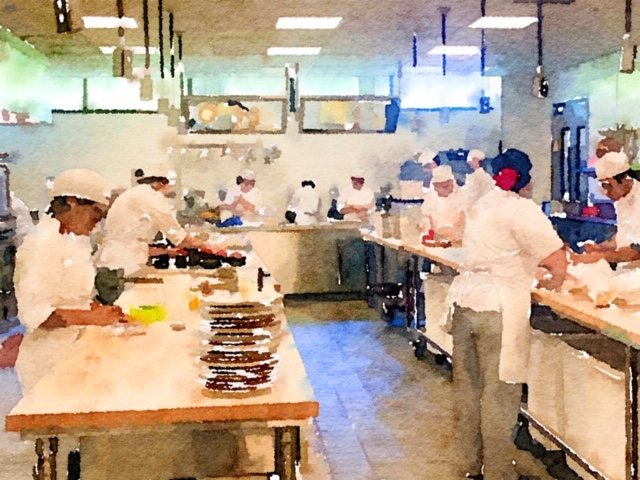
I’ve been reading an interesting book of advice from dozens of prominent chefs: “Chef Wise” from Phaidon Books. This is a compendium of quips that are based on experience; snippets of advice that we can all benefit from. It really is a valuable resource, especially for those in the early stages of a career in food. Of particular interest to me was a paragraph from Chef Sean Brock of Audrey Restaurant in Nashville (pages 289-290) that everyone should read. He speaks to all of us in succinct sentences, listing what he believes to be essential words of advice. This is my version and addition to his profound words:
EYES ON THE POSITION OF CHEF:
So, you want to make a career out of this kitchen work. Okay, tuck these guidelines in your pocket and read them every day:
- Show up on time, be ready to hit the ground running, be alert and prepared, and have a smile on your face.
- Don’t bullshit people – if you don’t know, then say: “I don’t know”, and then work like crazy to find the answer and or develop the skill that you are lacking. Start immediately!
- Early on in your career try to remember that you know very little so don’t try to show the chef or a seasoned veteran “how you would do a particular task”. Once you have proven yourself there will be plenty of opportunities for that.
- When in a formal or informal meeting speak when you have something valuable to say, not just when you think it’s your turn to talk.
- Listen more, talk less. Know the difference between listening and simply hearing.
- Treat the dishwasher with respect.
- Treat everyone with respect.
- Remember that no job is beneath you and everything in a kitchen is everyone’s job.
- Treat the ingredients you work with and the equipment you use as if you bought them with your own money.
- Act as if you are required to sign every plate that you cook and every task that you are assigned. Are you proud of your work?
- Be positive, even when it’s hard to do. There are far too many negative people in the world who work at bringing everyone else down – don’t be a member of that club.
- Approach every day with the goal of learning something new.
- Look and act like the professional you want to become.
- Be honest and trustworthy without this you will never earn a positive brand for yourself.
- Accept critique and know that it is not the same as criticism.
- Take care of your knives.
- Take care of your bodies: exercise, eat right, try to get enough sleep, see a doctor annually, care for your teeth, maintain a healthy weight, drink in moderation, etc. You know all of this, now practice it. You will fail to be good at your job is you are not good at caring for yourself.
- Find a hobby that makes you smile.
- Read whenever and whatever you can. Fiction, non-fiction, newspapers, cookbooks, respectable blogs, menus, etc. A balanced breadth of knowledge and an extensive vocabulary will be the result. Reading helps you to have something important to say when the time comes.
- Visit the source of ingredients you work with. Spend some time on a farm, a ranch, a fishing boat, a cheese making shop, an artisan bread bakery, a vineyard, brewery, or distillery – when you know the ingredient, what it takes to grow or raise it, fish, or produce it, shape or bake it, then you will be able to understand it and respect it through your cooking.
- Build your network of professional relationships. Get to know the serious cooks and chefs in your area, the producers and growers, the chefs outside your area that you respect, writers and influencers, academics and researchers, equipment representatives, and anyone who has a professional interest in the business you have chosen for a career.
- Pick the operations to work in where you can learn the most, the money will come when you have the knowledge and skills that warrant it.
- Never, ever, ever say anything negative publicly about a past employer, chef you have worked for, cook you have worked with, or another restaurant that is considered a competitor. You never want to be labeled as a person who might say the same about the next employer or co-worker. Remember those words from your grandmother: “If you can’t find something nice to say about another person, then don’t say anything at all.” It’s really a “small world” industry and what you say gets around.
- Support your co-workers – help them out, teach them what you know, learn from them – what you can, and know that the quality of their work will always impact the quality of yours.
- Take notes every day and review them: what went right, what went wrong, what did you learn, how will you correct your mistakes, how will today make you a better cook or person tomorrow.
- Be the example that others want to emulate.
This is certainly not a complete list, but it’s a damn good start. We all need to remind ourselves of these guidelines throughout our career.
PLAN BETTER – TRAIN HARDER
Harvest America Ventures, LLC
Restaurant Consulting
www.harvestamericacues.com BLOG
(Over 800 articles about the business and people of food)
CAFÉ Talks Podcast
https://cafemeetingplace.com/cafe-podcasts
More than 70 interviews with the most influential people in food

Leave a comment